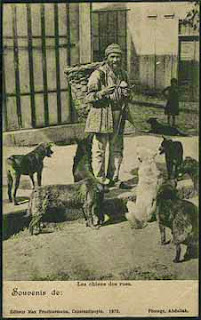For Miguel de Unamuno, it was always plague time.
Peter Koestenbaum neatly summarized the central themes of his work:
1. Individuality is primary; even one's nationality (e.g., Unamuno's Spanishness) "becomes not a social ideal but the expression of [one's] individuality."
2. The emphasis upon individuality leads, naturally, to a further emphasis upon personal integrity. "Truthfulness to oneself and total honesty in ideals are the hallmarks of the philosophical man."
3. The role of the philosopher [
faylasuf] is "Socratic gadfly to the community. The philosopher [
sic] is needed to awaken us to our genuine nature, to our authentic problems, and to the honest attempt to resolve them."
4. The demands of faith and reason are irreconcilable. Reason is skeptical and cannot produce "any kind of fundamentally hopeful knowledge. Faith can do so, but faith exists only in the shadow of the despair that is reason; it has no independent and positive existence. Faith can never totally dispel reason, and reason always leads to despair. The logic of the heart is hopeful and gives meaning to life, but it is never strong enough fully to set aside the darkness of the logic of the head."
5. Religion is, therefore, caught within the conflict of reason and faith; moreover, it is inadequate to the task of reconciling their conflict. Nevertheless, "religion is a necessity of life. We must risk faith in the way that Pascal wagered, James willed, and Kierkegaard leaped. We must, for profoundly pragmatic reasons, live as if God does in fact exist."
6. Commitment is the key to the authentic life. "An authentic life is dedicated to and identified with an ideal, an ideal that genuinely emanates from the depths of each man. The truth of such a commitment can be vindicated and confirmed only by the heart; but since reason casts permanent doubt on that commitment, a blind, courageous leap of faith is needed for authentic human existence."
7. "Life thus becomes a vague, brittle, and tenuous cluster of experiences between two awesome, incomprehensible, and impenetrable barriers of nothingness: birth and death. Only through a foundationless but fervid commitment can man escape, at least temporarily, the despair of meaninglessness."
8. The Spanish temperament is illustrated by Cervantes' Don Quixote and Sancho Panza: part impractical dreamer, part practical (and too often unprincipled and expedient) dullard.
For Koestenbaum, these eight points summed up Unamuno's grasp of human existence in his "tragic sense of life." Additional themes in Unamuno's work include:
9. An anguished awareness of the radical contingency of human existence assuaged only by a commitment to expand both the range and self-consciousness of one's perceptions of the world.
10. An acceptance of the suffering that such expansion inevitably entails.
11. An acknowledgement that human existence is shrouded in mystery, but that love (specifically sexual love) is the underlying force of human existence.
12. Like Heidegger, Unamuno conceived of
Dasein as essentially future-oriented; this future-orientation produced both hope and the agony of hope's fulfillment deferred.
13. "Language is a mode of being."
14. Truth is subjectivity. Even so, "man and world are intimately meshed."
15. Reality is "a state of permanent flux."
From
The Encyclopedia of Philosophy article on Unamuno (1967).







































